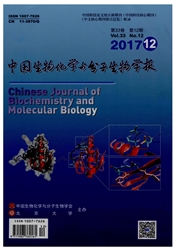

 中文摘要:
中文摘要:
活化的T细胞核内因子(nuclear factor of activated T-cells,NFAT)作为细胞信号转导通路中的一类重要的转录因子参与细胞功能的调节.NFAT的活化主要是通过细胞内钙/钙调神经磷酸酶(Ca2+/calcineurin)的刺激启动,它脱磷酸后发生核转位并与DNA的特定序列结合,同时通过与其它转录因子的协同作用,调节目的基因的特定表达.NFAT在免疫系统中所调节的基因表达已经得到了充分的研究.近年实验研究发现,NFAT的转录因子家族在脊椎动物的神经系统中也发挥着非常重要的作用.本文综述了NFAT家族蛋白的分类、结构、磷酸酶与激酶对其出入核的调节及在神经系统中的研究进展,使得能够更加全面地认识calcineurin/NFAT信号通路的作用.此外,由于环孢菌素A(cyclosporin A)等药物在神经系统应用的局限性,对于NFAT调节深入研究,也将为筛选或者开发更为高效、低毒药物提供新的思路.
 英文摘要:
英文摘要:
Nuclear factor of activated T cells (NFAT) is an important family of cellular signaltransduction transcription factor involved in the regulation of cell function. NFAT is activated mainly byCa2+/calcineurin. Activated NFAT translocates from the cytosol to the nucleus and regulates theexpression of target genes by binding to chromatin in combination with other transcription factors. Recentexperimental evidence has shown that NFAT signaling play an important role in nerve tissue. This reviewwill discuss the structure of NFAT, regulation of NFAT by phosphatase and kinase, as well as the currentresearch related to NFAT signaling in the nervous system. The knowledge will help us screen moreefficient, low toxic inhibitors of calcineurin/NFAT signaling in comparison with classic cyclosporin A.
 同期刊论文项目
同期刊论文项目
 同项目期刊论文
同项目期刊论文
 期刊信息
期刊信息
